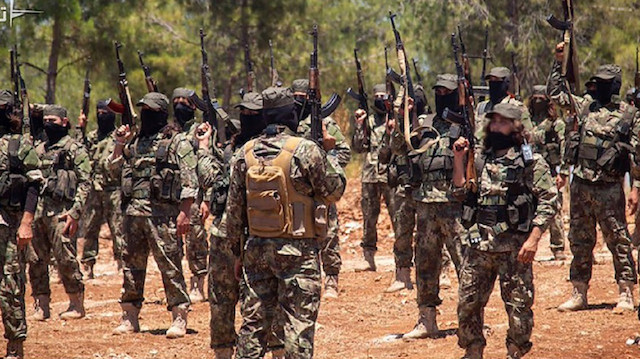

File photo
Tasked with upending the status quo in Turkey-protected Idlib, the HTS issued a fatwa, or a religious decree, permitting its militants to fight the FSA and seizing regions under their control
Cells belonging to the Saudi and UAE-backed Hayat Tahrir al-Sham (HTS) issued a fatwa declaring Free Syrian Army (FSA) factions as “apostates,” as they stepped up their attacks in the northwestern province of Idlib.
Tasked with upending the status quo in Turkey-protected Idlib, the HTS issued a fatwa, or a religious decree, permitting its militants to fight the FSA and seizing regions under their control.
The move comes as Turkey renews its resolve in Manbij and east of the Euphrates, with some cells of the U.S.-controlled terror groups in Syria going into gear in a bid to sabotage the Sochi peace agreement brokered by Ankara and Moscow in the region.
It is thought that the Gulf-based alliance, comprising of Saudi Arabia, UAE, Egypt and Israel, is behind the latest spike in violence in Idlib.
Over the past few days, HTS militants, funded by Saudis and Emiratis, have attacked and seized several FSA-controlled regions across Idlib.
Jordanian HTS military commander Abu Hussein al-Urduni, known for his close ties to Daesh, gave the orders to HTS militants to attack the FSA, in a bid to seize FSA weapons and block reinforcements dispatched to take part in the imminent operation east of the Euphrates.
A secret meeting held in a Gulf capital last month and attended by Israel, Saudi Arabia, United Arab Emirates and Egypt designated Turkey as a “major threat” in the region, according to media reports.
Mossad Chief Yossi Cohen is reported to have said at the meeting: “Iranian power is fragile. The real threat comes from Turkey."
One of measures agreed to in the meeting was to attempt to keep Turkey out of Manbij and the east of the Euphrates, and drive out Turkish Armed Forces (TAF) from Idlib.
The four countries also agreed to lay the groundwork for a Russia-backed Assad regime attack on Idlib, in order to sabotage the Ankara-Moscow alliance.
It is thought that hundreds of Daesh terrorists dispatched by the U.S.-PKK alliance in Idlib are taking part in HTS attacks against FSA positions.
Turkey’s Defense Minister Hulusi Akar discussed regional security issues with his Russian counterpart Sergey Shoygu in a phone call on Wednesday.
The latest developments in Syria’s northeastern province of Idlib were discussed in the context of the Sochi agreement, according to a statement released by the Turkish Defense Ministry.
Following a meeting on Sept. 17, 2018 in the Russian city of Sochi between Turkish President Recep Tayyip Erdogan and his Russian counterpart Vladimir Putin, the two sides agreed to set up a demilitarized zone -- in which acts of aggression are expressly prohibited -- in Syria’s Idlib province.
According to the terms of the deal, opposition groups in Idlib will remain in areas in which they are already present while Russia and Turkey will conduct joint patrols in the area with a view to preventing a resumption of fighting.
#HTS
#Idlib
#Turkey
#PKK
#UAE
#Saudi
#Syria


